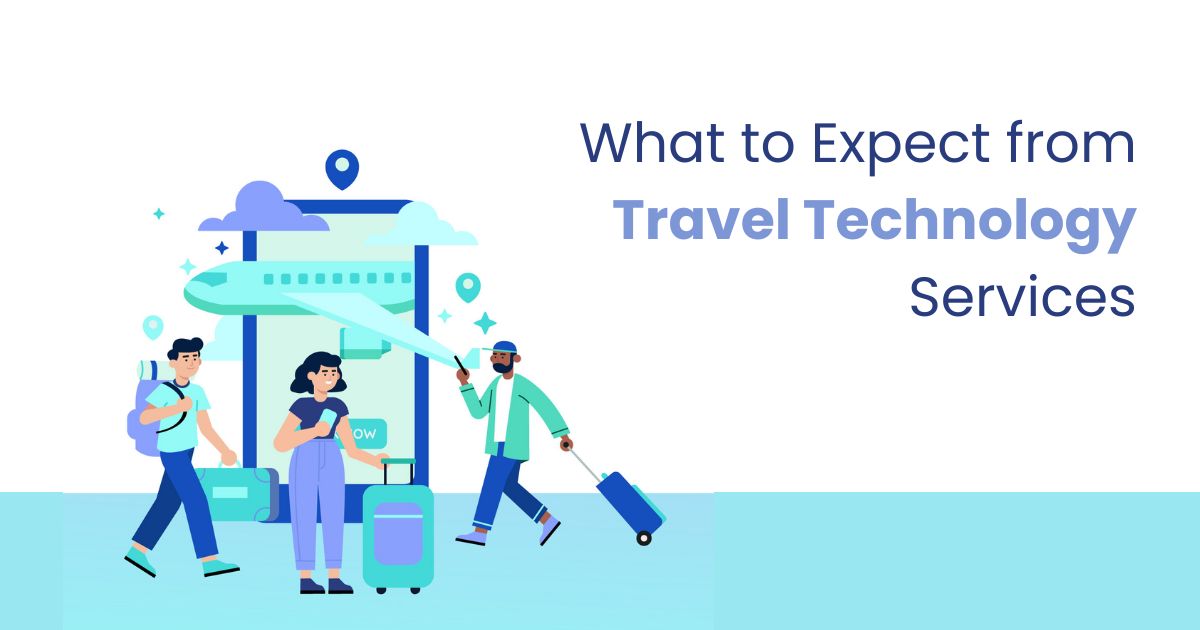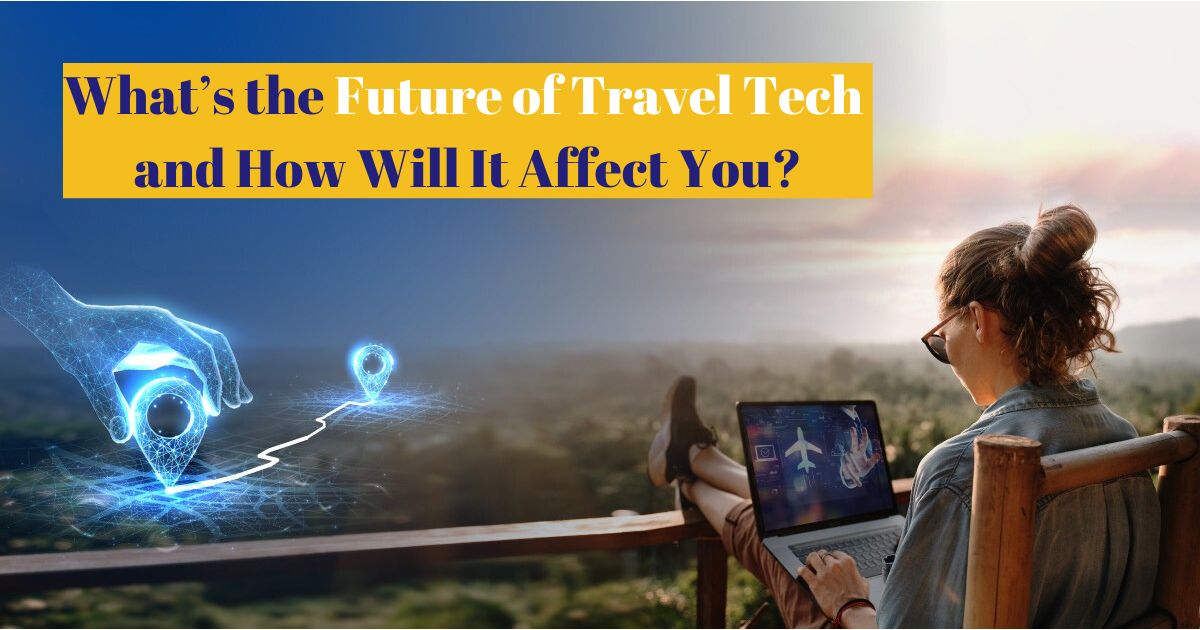The travel industry has undergone significant transformation over the past decade, primarily driven by advancements in technology. As we move into 2024, the role of travel technology services is set to become even more critical, offering enhanced experiences, operational efficiency, and tailored solutions for both travelers and travel businesses. With growing demand for personalized, seamless, and sustainable travel experiences, technology is the backbone of this evolution. In this article, we will explore in detail what to expect from travel technology services in 2024, focusing on key trends, innovations, and impacts that will shape the future of the travel industry.
Travel Technology Solutions: Enhancing Your Travel Journey with Advanced Technology SolutionsIntroduction to Travel Technology Services
Travel technology services encompass a wide range of solutions that help travel businesses manage operations, enhance customer experiences, and stay competitive. From booking systems to customer relationship management (CRM) platforms, technology has become indispensable in modern travel. In 2024, travel technology will not only focus on streamlining business operations but also on improving traveler engagement through personalized services and real-time data analytics.
Key Components of Travel Technology Services:
- Online Booking Systems: Integrated platforms that allow users to book flights, hotels, and tours in real-time.
- Travel Management Software: Solutions for managing travel itineraries, expenses, and reporting.
- CRM Systems: Tools designed to manage and enhance customer relationships through targeted communication.
- Data Analytics: Platforms that analyze customer behavior, preferences, and trends to improve service offerings.
The importance of travel technology cannot be overstated, as it ensures efficiency, scalability, and customer satisfaction.
The Growth of AI and Machine Learning in Travel Technology
Artificial Intelligence (AI) and Machine Learning (ML) are becoming more prominent in travel technology, driving automation, personalization, and real-time decision-making. In 2024, AI and ML will continue to revolutionize the travel industry by providing intelligent solutions to predict traveler behavior, streamline operations, and enhance customer experiences.
AI and ML Applications in Travel:
- Chatbots and Virtual Assistants: AI-powered chatbots offer 24/7 customer service, providing instant responses to traveler queries, helping with booking, and resolving issues efficiently.
- Predictive Pricing: Machine learning algorithms analyze historical data and current market trends to predict pricing patterns for flights, hotels, and car rentals, allowing travelers to make informed decisions.
- Personalized Recommendations: AI can analyze past travel behavior to offer personalized recommendations for destinations, accommodations, and activities, enhancing the traveler’s experience.
- Automation of Routine Tasks: AI can automate tasks such as ticketing, customer service, and flight check-ins, reducing human intervention and improving operational efficiency.
The integration of AI and ML will continue to transform travel technology services in 2024, enabling businesses to offer more efficient, tailored, and engaging services.
Personalization and Customization: The Future of Traveler Experiences
Travelers in 2024 will increasingly demand personalized and customized experiences tailored to their preferences, needs, and interests. Technology is the key enabler of this shift, providing travel companies with the tools they need to gather and analyze data to create unique and memorable experiences for each traveler.
Personalization Trends in Travel Technology:
- Personalized Itineraries: Travel platforms can analyze user preferences, past bookings, and browsing history to create custom itineraries that cater to individual interests.
- Targeted Marketing Campaigns: By leveraging data analytics, travel companies can launch targeted marketing campaigns that resonate with specific customer segments, improving engagement and conversion rates.
- Loyalty Programs: Advanced CRM systems enable the creation of personalized loyalty programs that reward travelers based on their individual preferences and travel habits.
- Tailored Travel Packages: AI-driven platforms can recommend tailored travel packages that include flights, hotels, and activities that align with the traveler’s interests and budget.
Personalization will become the cornerstone of travel technology services in 2024, helping travel companies build stronger relationships with their customers and offering enhanced, individualized travel experiences.
The Rise of Augmented Reality (AR) and Virtual Reality (VR)
Augmented Reality (AR) and Virtual Reality (VR) are poised to redefine how travelers explore destinations and interact with travel services in 2024. These immersive technologies will enhance pre-travel planning, on-site experiences, and post-travel memories, creating new opportunities for both travelers and travel businesses.
Key AR and VR Applications in Travel:
- Virtual Tours: VR enables travelers to explore destinations, hotels, and attractions virtually before making a booking decision. This immersive experience helps in building trust and enhancing customer satisfaction.
- Augmented Reality Navigation: AR-based applications will provide real-time navigation assistance to travelers, offering directions, nearby attractions, and local recommendations through their smartphones.
- Interactive Travel Guides: AR-powered travel guides can offer contextual information about landmarks, cultural sites, and tourist attractions, providing travelers with rich, interactive experiences.
- Enhanced Hotel and Property Viewing: Virtual reality allows potential guests to take virtual tours of hotel rooms, properties, and vacation rentals, making the booking process more transparent and informed.
The adoption of AR and VR in travel technology services will increase dramatically in 2024, providing travelers with engaging, immersive, and informative experiences before and during their trips.
Blockchain Technology in Travel: Enhancing Transparency and Security
Blockchain technology is becoming a game-changer in the travel industry, offering increased transparency, security, and efficiency in various operations, from payments to identity management. In 2024, blockchain is expected to play a pivotal role in improving traveler trust and reducing fraud within the travel ecosystem.
How Blockchain Will Impact Travel Technology:
- Secure Payments: Blockchain’s decentralized nature ensures that all transactions are secure, traceable, and transparent, minimizing the risk of fraud and chargebacks.
- Traveler Identification: Blockchain can be used for secure identity management, allowing travelers to store their personal information safely and share it with travel companies only when necessary.
- Loyalty Program Management: Blockchain enables the seamless management of loyalty programs, ensuring that rewards are secure, transferable, and can be redeemed across multiple partners.
- Smart Contracts: Blockchain-based smart contracts can automate and enforce agreements between travelers and service providers, reducing disputes and enhancing trust.
Blockchain’s role in travel technology services will expand in 2024, addressing many of the challenges related to data security, fraud prevention, and operational efficiency.
The Evolution of Payment Solutions in Travel
Payment solutions in the travel industry are evolving to meet the demands of a globalized, digital world. In 2024, the focus will be on offering seamless, secure, and diverse payment options that cater to travelers from different regions and backgrounds.
Emerging Payment Trends in Travel:
- Mobile Payments: The increasing use of mobile wallets such as Apple Pay, Google Pay, and Samsung Pay allows travelers to make quick and secure payments on the go.
- Cryptocurrency: The acceptance of cryptocurrencies such as Bitcoin and Ethereum is gaining traction, providing an alternative payment method for tech-savvy travelers.
- Buy Now, Pay Later (BNPL): BNPL options are becoming popular in the travel industry, allowing travelers to book their trips and pay in installments over time.
- Contactless Payments: The use of contactless payments has surged due to its convenience and safety, and this trend is expected to continue into 2024.
The evolution of payment solutions will provide more flexibility, security, and convenience for travelers, while travel companies benefit from faster transactions and reduced friction.
Sustainability and Eco-Friendly Travel Technology Solutions
Sustainability is becoming a core focus of the travel industry, with travelers and businesses alike seeking eco-friendly solutions. In 2024, travel technology services will prioritize sustainability by promoting green travel options, reducing carbon footprints, and offering more responsible travel choices.
Sustainable Travel Technology Innovations:
- Carbon Footprint Calculators: Travel platforms will integrate tools that allow travelers to calculate the carbon footprint of their flights, accommodations, and activities, helping them make more environmentally-conscious decisions.
- Green Travel Certifications: Technology will help travelers identify hotels, airlines, and tour operators that have received green certifications, promoting sustainable travel practices.
- Energy-Efficient Booking Systems: Travel companies will adopt energy-efficient cloud-based booking systems that minimize energy consumption and reduce their environmental impact.
- Eco-Friendly Transportation Options: Travel technology will support the growth of electric vehicles, public transportation, and bike-sharing programs, making it easier for travelers to choose sustainable transportation options.
Sustainability will continue to drive innovation in travel technology services, with both travelers and businesses seeking solutions that are environmentally responsible and efficient.
Mobile-First Travel Services: Meeting the Demand for Convenience
In 2024, mobile-first travel services will dominate the industry as travelers increasingly rely on their smartphones for every aspect of their journey. From booking flights to navigating foreign cities, mobile apps will provide the convenience, flexibility, and real-time information that modern travelers expect.
Key Features of Mobile-First Travel Services:
- Real-Time Updates: Mobile apps will offer real-time notifications for flight status, gate changes, and other important updates, ensuring that travelers are always informed.
- Mobile Check-In and Boarding Passes: Many airlines and hotels will continue to enhance their mobile check-in processes, allowing travelers to check in, access their boarding passes, and even use digital keys directly from their smartphones.
- Location-Based Services: Mobile apps will leverage GPS and location-based services to offer personalized recommendations, such as nearby attractions, restaurants, and real-time navigation assistance.
- Integrated Travel Management: Comprehensive travel apps will integrate various services, including booking, itinerary management, and customer support, into a single mobile platform for a seamless user experience.
The shift towards mobile-first solutions reflects the increasing importance of convenience and accessibility in travel, catering to the needs of tech-savvy travelers who expect everything at their fingertips.
Travel APIs and Integration Services: Streamlining Operations
APIs (Application Programming Interfaces) and integration services are critical for travel technology, enabling seamless connectivity between different systems and platforms. In 2024, travel businesses will rely on these services to streamline operations, improve efficiency, and enhance customer experiences.
Important Aspects of Travel APIs and Integration:
- API Ecosystem: Travel companies will use APIs to integrate various services, such as flight and hotel bookings, car rentals, and payment gateways, into their platforms, creating a unified travel experience.
- Data Sharing and Collaboration: APIs will facilitate data sharing between different travel service providers, enabling more effective collaboration and the creation of comprehensive travel packages.
- Customizable Solutions: APIs will allow travel companies to customize and tailor their offerings based on specific business needs and customer preferences, leading to more innovative and flexible solutions.
- Enhanced User Experience: Integration services will enable smoother interactions between travelers and travel companies, reducing friction and providing a more cohesive experience throughout the booking and travel process.
Travel APIs and integration services will play a crucial role in optimizing travel operations and enhancing the overall efficiency and effectiveness of travel technology services in 2024.
Data Analytics and Predictive Insights for Travel Businesses
Data analytics and predictive insights are becoming indispensable tools for travel businesses, helping them understand customer behavior, forecast trends, and make data-driven decisions. In 2024, the use of advanced analytics will be crucial for maintaining a competitive edge and delivering exceptional customer service.
Key Benefits of Data Analytics in Travel:
- Customer Insights: Data analytics tools will help travel companies analyze customer preferences, behaviors, and feedback, allowing for more personalized marketing and service offerings.
- Trend Forecasting: Predictive analytics will enable businesses to identify emerging travel trends, adjust strategies, and stay ahead of market demands.
- Revenue Optimization: Analytics will assist in dynamic pricing strategies by analyzing demand patterns, competitor pricing, and market conditions to maximize revenue.
- Operational Efficiency: Data-driven insights will help optimize operational processes, reduce costs, and improve resource allocation across various departments.
The ability to leverage data effectively will be a key differentiator for travel businesses in 2024, enabling them to offer more targeted, efficient, and satisfying experiences to their customers.
The Role of Internet of Things (IoT) in Travel Automation
The Internet of Things (IoT) is set to revolutionize the travel industry by enhancing automation, connectivity, and the overall travel experience. In 2024, IoT technology will play a significant role in streamlining travel operations and offering innovative solutions to both travelers and businesses.
IoT Applications in Travel:
- Smart Airports: IoT-enabled devices will improve airport operations by automating check-in processes, enhancing baggage tracking, and providing real-time information on flight status and gate changes.
- Connected Hotel Rooms: IoT technology will allow guests to control room settings, such as lighting, temperature, and entertainment systems, through their smartphones or voice-activated assistants.
- Wearable Technology: Wearables such as smartwatches and fitness trackers will offer travelers personalized recommendations, real-time updates, and health monitoring during their trips.
- Efficient Transportation: IoT solutions will enhance the management of transportation services, including ride-sharing, car rentals, and public transit, by providing real-time tracking and automated fare collection.
The integration of IoT in travel technology will lead to greater convenience, efficiency, and personalization, transforming how travelers interact with various aspects of their journeys.
Cloud-Based Solutions for Scalable Travel Technology Services
Cloud computing is becoming a fundamental component of travel technology, offering scalable and flexible solutions for managing operations, data, and customer interactions. In 2024, cloud-based solutions will continue to drive innovation and efficiency in the travel industry.
Advantages of Cloud-Based Solutions:
- Scalability: Cloud services allow travel companies to scale their technology infrastructure based on demand, ensuring that resources are allocated efficiently during peak travel periods.
- Cost Efficiency: Cloud computing reduces the need for significant upfront investments in hardware and software, offering a pay-as-you-go model that lowers operational costs.
- Enhanced Collaboration: Cloud-based platforms enable seamless collaboration between different departments and teams, improving communication and coordination across various functions.
- Data Security and Backup: Cloud providers offer robust security measures and backup solutions, ensuring that travel data is protected and recoverable in case of emergencies.
The adoption of cloud-based solutions will enable travel companies to stay agile, responsive, and competitive in a rapidly evolving industry.
Conclusion
As we look ahead to 2024, the travel technology landscape is poised for remarkable advancements and innovations. From AI and machine learning to blockchain and IoT, these technologies will reshape how travel businesses operate and how travelers experience their journeys. The emphasis on personalization, sustainability, and convenience will drive the development of new solutions and services, catering to the evolving needs of the travel industry.
Travel technology services in 2024 will not only enhance operational efficiency but also offer travelers more personalized, secure, and immersive experiences. By embracing these trends and innovations, travel businesses can position themselves at the forefront of the industry, delivering exceptional value and staying ahead of the competition.








